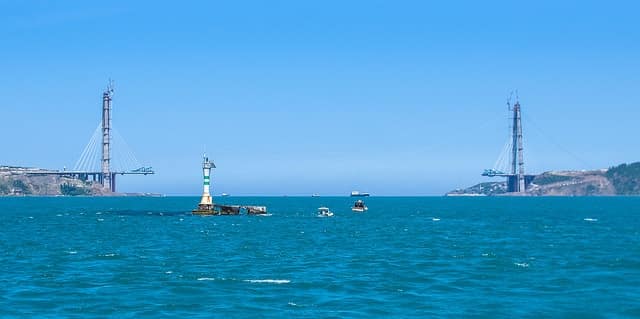For thousands of years the city that’s now Istanbul, and was once Constantinople and Byzantium, has been the gateway between Europe and Asia. The only obstruction in that gateway is the mile-and-a-half channel of the Bosphorus straits, currently spanned by Istanbul’s two bridges. Now, to direct traffic around the city instead of through it, Turkey is building the Yavuz Sultan Selim Bridge as the third link across the strait
Begun in May 2013 and scheduled for completion in 2016, the Yavuz Sultan bridge will be the longest combined motorway/railway bridge in the world and the eighth longest main span. It will be a hybrid cable-stayed suspension design with concrete towers on each shore of the strait and a single span between them. The bridge deck will consist of 44 steel sections supported by stiffening cables strung from the pylons, four cables per section, with additional support provided by the main cables at the centre of the span. When completed the bridge will carry the Northern Marmara Motorway and a railway, for a total of eight road lanes and two rail tracks.
The consortium building the bridge is led by Turkish firm İçtaş, with Astaldi of Italy as the main subcontractor. The total budget is estimated at just over €3.3 billion. That includes additional work that’s being done to preserve the wetlands north of Istanbul from the impact of the traffic the bridge will carry. To prevent environmental damage and disruption of the area’s natural drainage 65 viaducts and a small bridge are being constructed to carry the motorway and railway over the most vulnerable wetland areas.
The main span of the bridge, between the pylons, is 1,408 metres long and 59 metres wide. It will carry four motorway lanes in each direction, with the carriageways separated by twin railway tracks. It’s expected to carry around 135,000 vehicles per day – including all heavy goods traffic across the Bosphorus, which should make a huge difference to congestion in and around Istanbul.
The bridge will be stayed by 176 cables, with a maximum length of 597 metres. Each cable consists of up to 151 steel rope strands with seven 5.2mm wires per strand. The total length of rope in the bridge will be over 6,500km.
The deck will be stabilised by 34-ton bearings capable of withstanding vertical loads of 120 MN each – this is more than the weight of the Eiffel Tower. Each bearing allows 770mm of horizontal movement.
The bridge will hold three world records; longest main span, widest main span and tallest pylons – they will each be 322 metres high.

brdige
 Constructionshows
Constructionshows